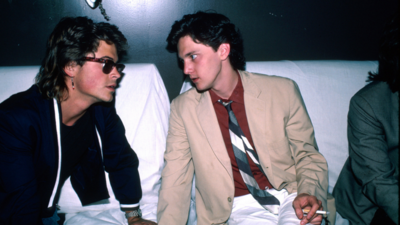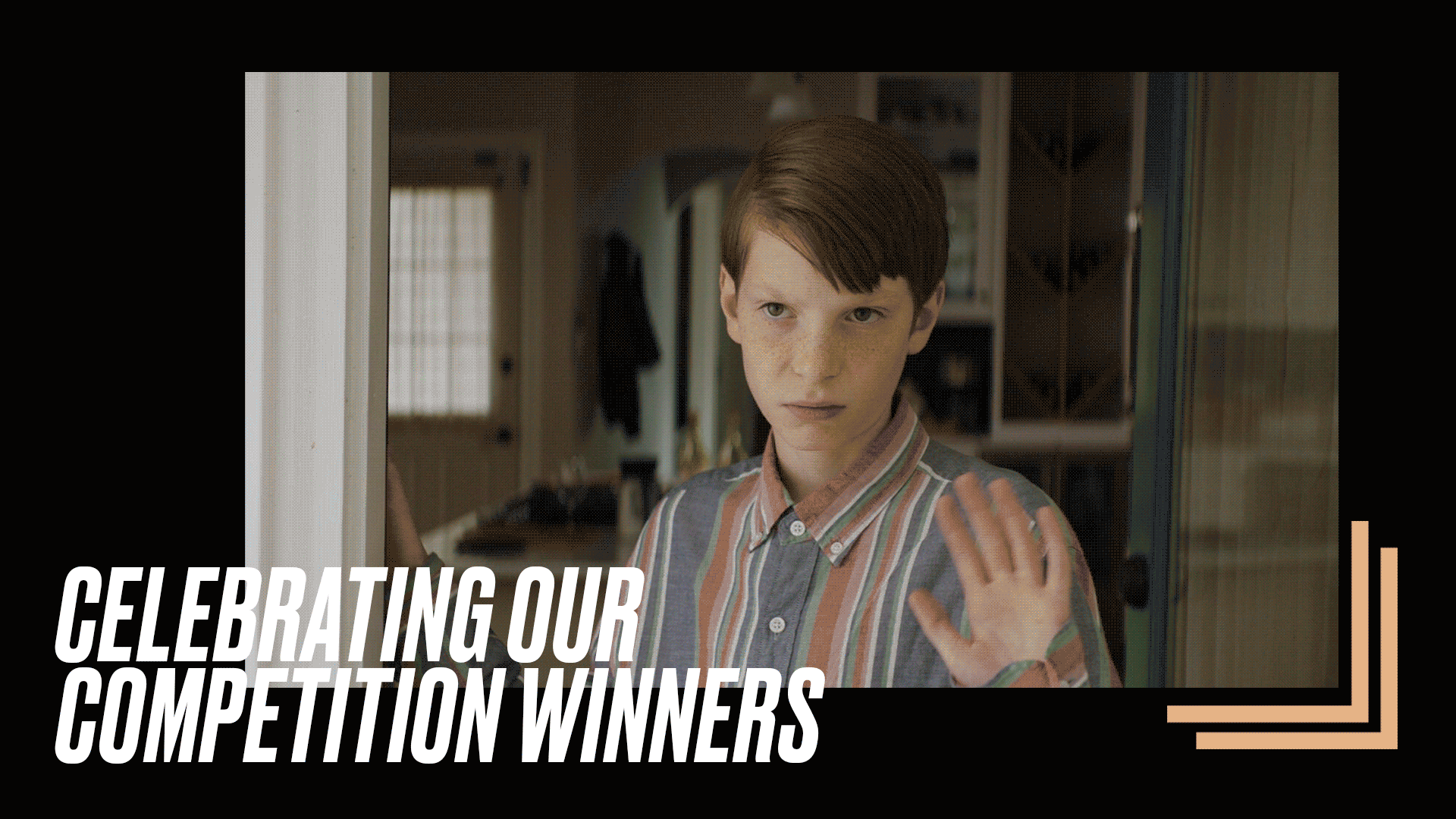
BY KRISTIN MC CRACKEN |
You Can't Always Get What You Want
Andrew Semans' feature debut Nancy, Please has a simple premise: it's about a man who wants a book. I mean, he really wants this book.

Tribeca: Tell us a little bit about Nancy, Please. How do you describe in your own words?
Andrew Semans: Nancy, Please is a satire about the consequences of refusing to accept responsibility and the desire to undermine one’s own life. We like to describe it as a black comedy that explores obsession, self-righteousness, and the perverse allure of victimhood in New Haven, Connecticut.
Or you could just say that it’s a movie about a man who badly wants a book.
Tribeca: What inspired you to tell the story, as a co-writer and director? Where did the story come from?
Andrew Semans: Well, with other movies that I've made in the past, I would usually try and come up with an extremely simple, rudimentary conflict and then just build from there. I like the idea of concentrating very closely on an extremely simple situation until other themes and characters and preoccupations emerge. And so for this movie, my co-writer and I decided that we would come up with the simplest conflict that we could think of, which was: Person A wants something Person B has, and Person B won't give that thing to Person A. Which is the basis for a common exercise in acting classes, incidentally.
Tribeca: So did it come from anything personal in your life?
Andrew Semans: People who see the movie always ask if I've had a similar experience, if it's autobiographical, and it's not. It's thematically autobiographical: the kinds of things the main character is wrestling with are things that I've certainly wrestled with. But no, the specifics and basic setup are totally made up.
Once we had this basic conflict, we just thought: Where does this take place? Who populates this world? And we decided that, because it was intended to be my first feature film—and because I knew it was going to be made for very little money—we would keep it very close to home and choose characters and an environment that we know very well from our own lives. So we kind of grafted these familiar people and a familiar context onto the basic conflict. From there it became less of an intellectual exercise and more of a movie about personal subject matter.
Tribeca: What can you tell us about your casting process? When you were writing, did you have actors in mind or are these people your friends?
Andrew Semans: I had a few friends in mind as templates, but I would never cast any of these friends because they're not actors. [laughs] I did have people in mind, but they were not options. So when we were casting, we did it in a very traditional way: we had a casting director, and we held auditions. Everybody in the movie—all of the leads, at least—just came and auditioned, and we picked those we liked the best. The one exception was the woman who plays Nancy—Eléonore Hendricks. I'd seen her in other movies and really admired her—in The Pleasure Of Being Robbed and Daddy Longlegs—so I pursued her specifically, and she agreed to do the movie.
Will Rogers, who plays Paul, and Santino Fontana, who plays Charlie, are well-known in New York theater circles, and for good reason.
Tribeca: How did you work with the actors? Was there room for improvisation in the rehearsal process? Did you have a rehearsal process?
Andrew Semans: We had an incredibly short, harrowing pre-production process. Due to a variety of circumstances, everything was done in tremendous haste. And so, no, we had no rehearsal, which terrified me because I need rehearsal, I want rehearsal, everything I've ever done I've had plenty of rehearsal, so it was very scary for me to go without. Also, the wordiness of the script and the nature of the dialogue—it's pretty specific and rather stage-y—made improvising seem like a bad option. We tried a little bit, but it was clear early on that it wouldn't match with the written dialogue. And we were also shooting at such a pace that there really wasn't a lot of room to play around. We had to stick to the script. But, luckily, the actors are all very experienced and are used to showing up prepared and know what to do, so that was a real life-saver.

Tribeca: What was the craziest thing or "lightning strikes" moment that happened during production?
Andrew Semans: Honestly—for a movie made at such a low budget, and under tough conditions, and in a big hurry—we surprisingly didn't have very many eureka moments or oh-my-God-the-sky-is-falling moments. I largely attribute that to my producers, Vinay Singh and Dave Saltzman, who, although fairly new to producing features, were really on the ball. It was hectic, it was hard, we didn't have enough time, we didn't have enough money—all of the stresses that usually come with a micro-budget movie—but it really went the way it was planned.
The only real curveball that jumps to mind is the squirrel in the film. We had a live squirrel for one of the scenes, and this squirrel proved difficult and reluctant to help us. We had a squirrel wrangler who was very frank and told us ahead of the time that you can't train a squirrel; they're insane by nature and just do whatever the hell they want. She told us that she and the squirrel would show up on set, and the squirrel would do whatever it felt like and we were going to just have to roll with it. We had written a very specific scene where a squirrel had to be quite... dramatic. And the squirrel, named Baby Lionel, was not interested in doing what we wanted it to do—he had its own agenda and was kind of an asshole. So the scene with the squirrel became more of a comic scene than what we had in mind. But it ultimately made more sense in the context of the finished movie, which is a relief.
Tribeca: So how was directing Nancy, Please different from your work on shorts? How was your transition, and what lessons did you take from the experience that you could share?
Andrew Semans: I produced my own shorts and they were made with very, very small crews; I was in control of everything. This was the first time I worked in this sort quasi-industrial production model, where you had department heads and an AD, and a second AD, and there were a lot more people: a camera crew, an Art Department. So it had to be an organized shoot, with call sheets and schedules, and we’d have to make our days and couldn’t go overtime and all of things that I’d never really encountered on my shorts. That required some adjustment for me. The thing that required the most adjustment is how little time we had. It was tough to breathe.
Tribeca: Do you have any advice for someone who's going to take the same leap from shorts to features?
Andrew Semans: My advice would be to plan as meticulously as possible and to do as much ahead of time as possible. I know that's what everybody says, but it's true. For me, because it was so new, everything came as a surprise, to a certain extent. So I would tell aspiring filmmakers: do whatever you can to avoid surprises when you get on set. There are always going to be surprises and challenges, so you have to adapt. But the more you have planned, the better—unless you're the kind of person who just likes to wing it and go with the flow and improvise and see where it takes you, but this was not that kind of movie.
Tribeca: What are you most looking forward to at Tribeca?
Andrew Semans: Free booze. [Laughs.] I'm thrilled. I'm tremendously thrilled. It's really meaningful for me that [the film] is in Tribeca. New York's my home and I've been here for a lot of years, and everyone who worked on the movie is in New York: cast, crew, everybody. And it's just so exciting to be able to premiere it here with all of the New York people, in New York City, in a theater that I've been to many, many times. It's all very exciting.
Tribeca: If you could have dinner with any filmmaker alive or dead who would it be?
Andrew Semans: Lukas Moodyson seems like he’d be a fun dinner companion. Yoko Ono, maybe? Where are we eating?
Tribeca: What's your favorite New York movie?
Andrew Semans: Dog Day Afternoon or Little Murders.
Tribeca: What would your biopic be called?
Andrew Semans: Any reasonably accurate biopic of me would consist largely of a man napping and eating tacos. So I guess I would call it Napping and Eating Tacos.
Tribeca: We could totally hang out... And finally, what makes Nancy, Please a Tribeca must-see?
Andrew Semans: Because it features squirrels, cruel beatings, academic malaise, and lots of white people talking.

Andrew Semans is a filmmaker based in Brooklyn. He graduated from the School of Visual Arts in New York and directed the shorts All Day Long, I'd Rather Be Dead Than Live in This World, and I Know Where I'm Going. Nancy, Please is his first feature film.

